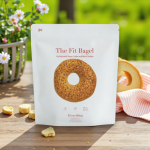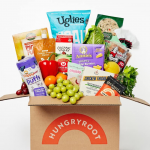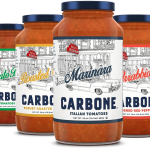‘The Era of The Empanada’: Inside Maspanadas’ New Production Gains

While COVID-19 may have pushed some businesses to the point of no return, for Latin Goodness Foods, its pandemic-era pivot deeper into CPG is beginning to pay off.
The women- and Hispanic-owned company, which produces frozen empanadas under the brand Maspanadas, opened a new 12,000 sq. ft. manufacturing facility in Rockville, Md. in September as it scales up production to meet a growing slate of retail commitments. The facility – just down the road from its first production plant – is a major milestone in the business’s growth and will be essential to its long-term growth strategy, explained founder and CEO Margarita Womack.
“We started as a [catering] business, and empanadas were our best sellers,” Womack explained. “[We then saw] there’s a real business opportunity in frozen foods… but my family thought it was completely insane. Empanadas are street food you buy on a corner from a cart, like you buy hot dogs in New York. It would be like trying to make hot dogs and sell them frozen in Japan.”
Maspandas now sells a 5-SKU line of frozen empanadas made with simple ingredients and no artificial colors or preservatives. Nosh stopped by the new facility on its third day of production to see how it has introduced automation into the empanada-making process while maintaining its commitment to real, homemade food.
The line will be able to produce five times the capacity when all three production lines are complete – approximately 300,000 1 oz. mini empanadas per day – a major increase from the capacity Womack began with just seven years ago in her own kitchen, hand making the product in small plastic molds. That increased capacity will allow it to expand its product lineup and ramp up its private label business.
“There’s still quite a bit we can do within the empanada space,” said Womack. “My husband – a regular American guy – explains empanadas to people like barbecue… if I tell you barbecue, you’ll think there’s Texas style, there’s Tennessee style, there’s South Carolina, there’s sweet ones, there’s hot ones. We’re talking about barbecue, but we have all these different senses of what it is. Even within a country, there’s variation in their empanadas.”

Pandemic Era Pivot Pays Off
Maspanadas expanded into its first plant after outgrowing the shared space at Union Kitchen in Washington, D.C. It had begun working with a regional distributor right before the onset of the pandemic and grew the business significantly within event venues, hotels, country clubs and other on-premise, foodservice-aligned accounts. At the time, the company had just begun to establish Maspanadas as a brand, and its business was 90% foodservice at that point, Womack said.
Then the pandemic hit. The company’s foodservice and on-premise accounts, which had generated nearly $170,000 in sales the year before, were wiped out. That pushed Maspanadas to shift its focus deeper into CPG.
“We doubled the size of our facility at that point [during the pandemic], took over two more bays and built them out and bought all of this equipment,” said Womack, joking that she even enlisted her children to come help at various points.
“We started building [our first] line with popsicle sticks and duct tape,” Womack said. “Really, there was actually quite a bit of duct tape… we got time to really refine the processes and be creative. We had to figure out how to fix a problem with [only the] tools and resources you have at hand. But at the same time, I was trying to plan what’s next, and how do we get to the line like [we have now]. And even now, we know we can go even bigger.”
The new space was funded with a Small Business Administration 7A loan, backed by Capital Bank and the support of the company’s new landlord, Womack explained. Plant operations are overseen by COO Jorge Federico Meade, the former president of Tacombi’s CPG division, Vista Hermosa. Federico has also served as President and COO of Enjoy Life Foods and held a range of marketing roles within Nestlé’s Pet division.
Fellow D.C.-local CPG frozen startup Jesse & Ben’s has taken over the company’s past facility, and Womack said she has been in close contact with the founders as they get set up and acclimated with some of the equipment Maspanadas passed along. She highlighted that the two CPG companies have the added bonus of being able to coordinate equipment maintenance and service needs on their similar equipment.

Going For Growth
With one production line fully operational, Maspanadas is working to steadily grow capacity with the addition of two more lines over the coming years. Currently, about 25 employees are on the production floor at a time with the factory running 24 hours a day across three shifts. Once the buildout is complete, Womack expects to employ 120 workers at the facility.
While the move into the new facility had a nearly two-year-long runway, the completion of the expansion came at the perfect moment in time. Maspanadas just launched at Whole Foods globally in addition to beginning a second rotation in Costco’s Northeast region. It is also gearing up for a rollout to Wegmans stores in the coming months and will be in a total of 3,200 retail doors nationwide.
The brand also has new innovation coming down the line including an expansion into breakfast empanadas that will bring the brand to a new area of the frozen aisle. The egg-based product line will feature vegetables and Latin flavors with three SKUs total, one vegetarian-friendly version and two with added protein. The new facility also allows it the capacity to produce seasonal varieties.
It is looking to tap additional merchandising opportunities to build brand awareness including slacking out the product in refrigerated and fresh sets as a quick grab-and-go snack. With the new facility, Maspanadas has the ability to produce various sizes of empanadas as well.
Those efforts will be key to the brand’s continued success, Womack notes, explaining it hasn’t made any serious investments in marketing with growth thus far. The moves to different areas of the frozen aisle, as well as out and into fresh altogether, will be key as it works to capture the attention of new consumer groups.
In terms of growing the business, Womack said it has considered co-packing opportunities but has not yet received a large enough order size that the effort would “make sense.” For now, it is focused on growing its private label arm with strategic customers. Womack said it aims to double that leg of the business and emphasized that, even within private label, it wants to specialize in the premium space.
Coming for the Competition
Frozen empanadas is still a relatively niche space, but Womack claims Maspanadas is the fastest growing among the top three brands in the set. Its position as a category disruptor has also come at an integral time where retailers are looking to not only diversify the foods on their shelves, but also do so with products that boast clean ingredients.
“You have this diversity [in people] across the U.S., and it was not represented [in frozen food],” Womack said while recounting a recent conversation with Chris Manca, a global category merchant at Whole Foods, who highlighted that he has made it a priority to diversify the aisle in Whole Foods stores. “There’s all these wonderful frozen foods – dumplings, Bao buns and more – that you can have and have much more fun with the spectrum of colors and flavors.”
Consumer demand for diverse foods and flavors is evidenced by PepsiCo’s pending acquisition of Siete Foods for $1.2 billion, which was announced just days before we visited Maspanadas’ facility. Womack shared her excitement about that deal, emphasizing that she believes it validates the potential of this new, better-for-you wave of Latin foods across aisles of the grocery store.
Legacy brands like Goya Foods as well as startups like Brazi Bites offer a handful of frozen empanadas varieties. Womack has also connected and helped advise other CPG empanada makers including Belen Rodriguez, who was forced to shutter her frozen foods startup Quebracho earlier this year after seven years in operation due to a lack of funding.
That is another key factor why the Siete-PepsiCo deal was a positive sign for Maspanadas, which just closed its first round of seed funding to kickstart its marketing efforts. Womack believes PepsiCo’s validation of the space will be essential to its continued momentum and shared that once she finally locked in a lead investor, the rest of its seed round investors quickly fell into place.
“Such a weird and interesting thing that everybody wanted somebody else to validate the deal before investing,” she said.
With the round closed, Maspanadas now “is walking towards a Series A,” Womack said, and feels confident that her hunch back in 2017 can usher in the “era of the empanada.”


















